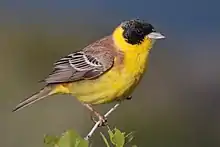bunting
English
Etymology 1
.jpg.webp)
Possibly from dialect bunting (“sifting flour”), from Middle English bonten (“to sift”), hence the material used for that purpose. Possibly from Germanic bundt (“to bind or tie together”).
Noun
bunting (countable and uncountable, plural buntings)
Translations
|
|
Etymology 2

From Middle English bunting, bountyng, buntynge (also as Middle English buntyle), of uncertain origin. Possibly a reference to speckled plumage, from an unrecorded Middle English *bunt (“spotted, speckled, pied”) akin to Dutch bont, Middle Low German bunt, bont, German bunt (“multi-coloured”) + -ing.[1]
Noun
bunting (plural buntings)
Derived terms
- black-faced bunting
- black-headed bunting (Emberiza melanocephala)
- chestnut-eared bunting
- cinereous bunting
- cirl bunting
- corn bunting (Emberiza calandra)
- Cretzschmar's bunting
- gray-necked bunting
- grey-headed bunting
- grey-hooded bunting
- grey-necked bunting
- Henslow's bunting
- indigo bunting (Passerina cyanea)
- lark bunting
- LeConte's bunting
- little bunting
- ortolan bunting
- painted bunting (Passerina ciris or Calcarius pictus)
- Pallas's bunting
- pine bunting (Emberiza melanocephala
- reed bunting (Emberiza schoeniclus)
- rock bunting (Emberiza cia)
- rustic bunting
- snow bunting (Plectrophenax nivalis)
- yellow-breasted bunting
- yellow-browed bunting
- yellow bunting
Translations
|
Etymology 3
1922,[2] apparently from Scots buntin (“plump, short and thick (esp. of children)”),[3][4] itself an old term of endearment for children (1660s); the sense “plump” dates to the 1500s,[3] and may be related to bunt (“belly of a sail”). Possibly related to butt (“(both noun and verb sense: buttocks; strike with head)”)[3] or to bunny (“rabbit”). Compare with the nursery rhyme Bye, baby Bunting (1731), either of same origin or influenced this sense.[5]
Noun
bunting (plural buntings)
Noun
bunting (countable and uncountable, plural buntings)
References
- Douglas Harper (2001–2024) “bunting”, in Online Etymology Dictionary.
- “bunting”, in Merriam-Webster Online Dictionary, Springfield, Mass.: Merriam-Webster, 1996–present.
- Patricia T. O’Conner, Stewart Kellerman (2010 April 13) “Bye, baby bunting”, in Grammarphobia
- See John Jamieson, An Etymological Dictionary of the Scottish Language (1808-25): buntin “short and thick; as a buntin brat, a plump child.”
- Merriam-Webster’s New International Dictionary (unabridged 2nd edition)
Indonesian
Alternative forms
- boenting (pre-1947)
Pronunciation
- IPA(key): /bʊn.tɪŋ/
- Rhymes: -ʊntɪŋ, -tɪŋ, -ɪŋ
Verb
bunting
- (derogatory, of human only) to be pregnant, to get pregnant
- Synonyms: hamil, mengandung
Derived terms
- buntingan
- kebuntingan
- membunting
- membuntingi
- membuntingkan
- bunting bantang
- bunting besar
- bunting gelap
- bunting jolong
- bunting kecil
- bunting kerbau
- bunting muda
- bunting sarat
- bunting suri
- bunting tua
Further reading
- “bunting” in Kamus Besar Bahasa Indonesia, Jakarta: Agency for Language Development and Cultivation – Ministry of Education, Culture, Research, and Technology of the Republic of Indonesia, 2016.